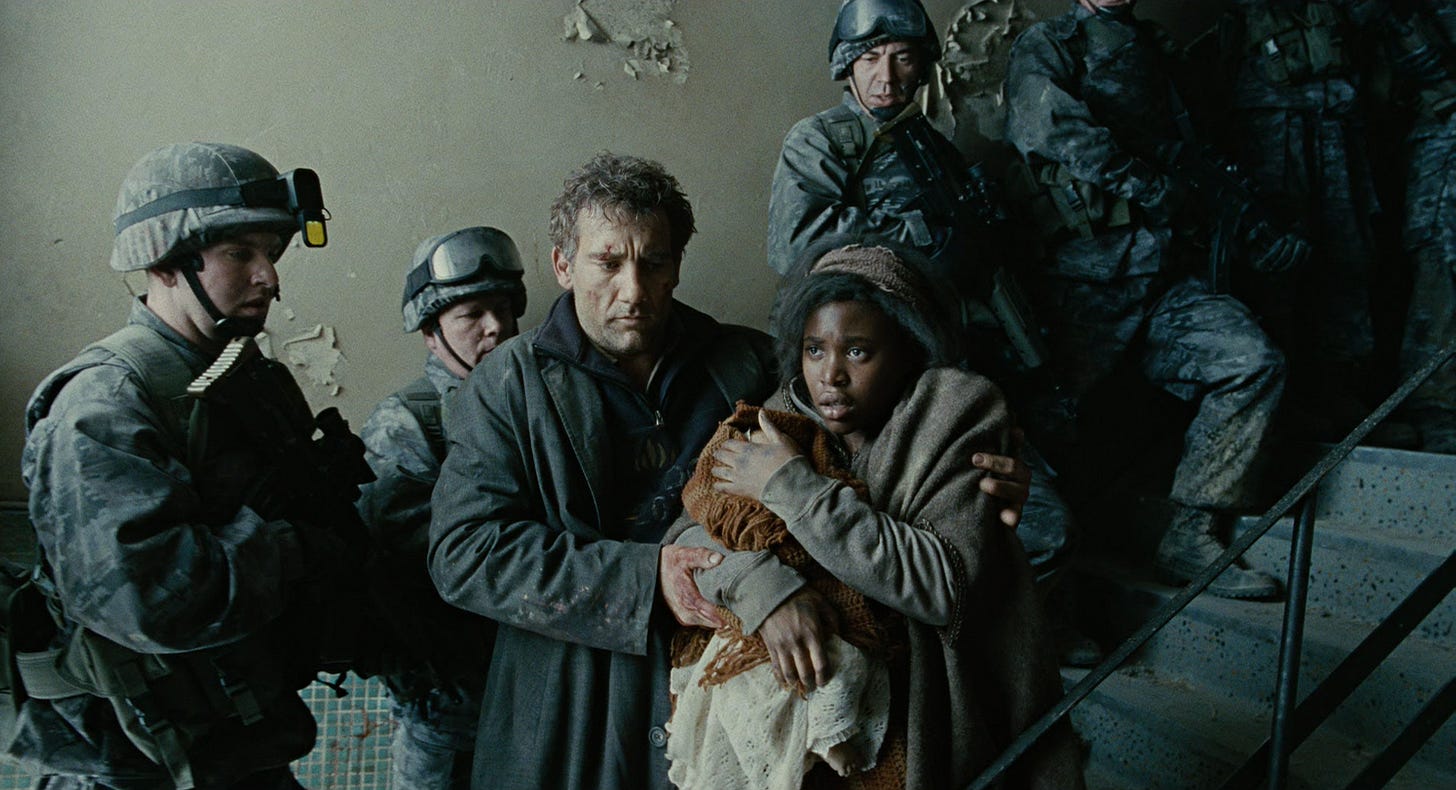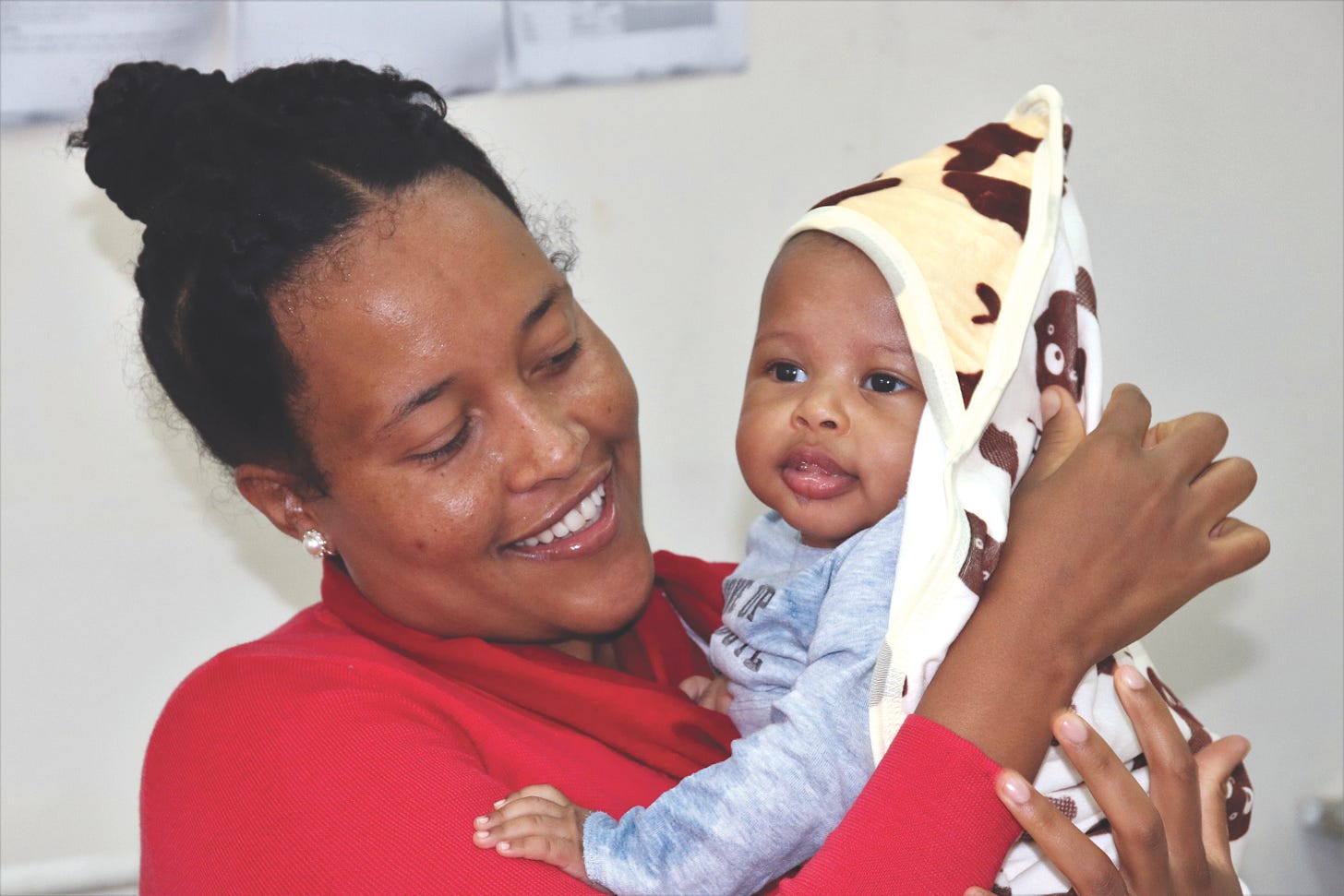I’d like to share a reflection on the Incarnation with you today, but first I just want to thank each and every one of you for subscribing to this Substack. Thank you for following my writing over the years. Thank you for staying in touch as I remove myself more and more from social media (life is so much better with less Twitter in it). I’m grateful for all 4,300 of you.
In the new year I hope to spend a bit more time writing here. I’m going to be sharing some bi-monthly literary reflections (more on that soon) and my miscellaneous thoughts as well as details on speaking events and new book releases and all that jazz.
And without further ado…some thoughts on Advent:
I can’t think of a more powerful visual image of the Incarnation than the film adaptation of the dystopian novel Children of Men by P.D. James.
I saw the film in the theatre when it released and it’s one of the few movies that has ever made me feel physically ill. In the near future of the story, every human being has become infertile. It’s been decades since a baby has been born. Society is imploding. Warfare and violence are everywhere. Despair is overwhelming. Schools close because there are no schoolchildren. Museums close because there is no one to preserve artifacts and art for. With no children, nothing has significance anymore. It wasn’t the violence in the story, but the extreme hopelessness of the film that forced me to close my eyes at times and fight the urge to vomit.
But then, a thrill of hope. A woman falls pregnant. A child is born.
In a heartstopping scene, a man is trying to protect the young mother and the miracle baby in her arms amidst the guns firing and bombs exploding all around them. As the wee baby cries, people gasp, desperate to see the newborn. People fall to their knees and beg to touch the child’s tiny foot. The shadow of death surrounds them, but the people only have eyes for the child. In the darkness, the light of hope shines. Soldiers drop their guns and scream for a cease fire so that the child will not be harmed. You can watch the scene here (warning for violence and language) and I hope you do because I think it’s a life-changing scene.
But you cannot watch this scene without thinking of the Holy Family and St. Joseph protecting the Mother of God and her precious baby. You cannot help but be overwhelmed by the power of a child, the hope of a new baby, the glory of the Incarnation.
It often seems so upside down that an infinitely powerful God would come to us as a powerless child. There is surely nothing more vulnerable than a newborn baby. And yet, is there anything more powerful than a child? Isn’t every baby that is born significant enough to stop the world in its tracks? As a mother I have held my babies in their first weeks of life, watching them as they fall asleep, and been struck by the idea that I have never held anything so weighty in my arms, that I am holding my whole world, what matters most in the universe. I am shocked that my arms can contain such a gift. Does it not make sense that God in his vulnerability and in his power would arrive as a newborn baby in the midst of our violence, darkness, and despair?
Long lay the world in sin and error pining
Till he appear'd and the soul felt its worth.
A thrill of hope the weary soul rejoices
For yonder breaks a new and glorious morn!
Fall on your knees
Oh hear the angel voices
Oh night divine
Oh night when Christ was born
In this Advent season, may the power of the Incarnation makes you fall to your knees in praise. May the hope of the Christ Child bring songs of joy to your lips. May peace descend on our violent world because the True King has come to claim his throne in our hearts.
In light of this holy season, I’d also like to invite you to protect the lives of mothers and newborns who are in need of medical care. This year I’m partnering with Cross Catholic Outreach to share about the good work of the St. Gabriel Health Center in Addis Ababa, Ethiopia that provides life-saving prenatal, delivery, and newborn care to women who cannot otherwise afford it. With the maternal mortality rate being 17 times higher than in the US, lack of medical care during pregnancy and delivery can be fatal for many women. Can you make it possible for the St. Gabriel Health Center (which provides some of the best medical care in Ethiopia) serve some of the poorest families of Addis Ababa?
Please consider donating here (or read more about it on my neglected blog).
God bless you!






it so often happens when I read your words that I feel like my innermost yearnings, questions and hopes tumble together into something coherent and beautiful, that I could never have shaped myself. Thank you for this profound reflection. It has made my Advent all at once deeper and more understandable. I’m so grateful for your work.
Just a heads up, the novel and movie are VERY different. Both have the central plot point of infertility (women are infertile in the film, while in the book, men are infertile), but while the film has the main character undergo a conversion of sorts and practice self-sacrifice for the sake of the woman and her child (you're right, it's very much a St. Joseph character, and the director uses a lot of Marian imagery as well), the novel has the man ultimately exploit the woman and her child to secure his own power. Both have that child be, in a way, the hope for mankind, but in the film that hope is seen as worth dying for while in the book it's the ultimate source of power. (As a result, the book is WAY more depressing, though also worth reading for its own sake as a separate sort of story).
I did a paper on this film in college as part of my philosophy degree. In it, I argued that voluntarily giving up the ability to have children would result in much the same sort of world as losing that ability, and that a philosophy based on pleasure ultimately results in that sort of society. I had a professor or two call me an extremist for that paper, but the older I get, the truer it seems to hold. And the more precious the Incarnation becomes.